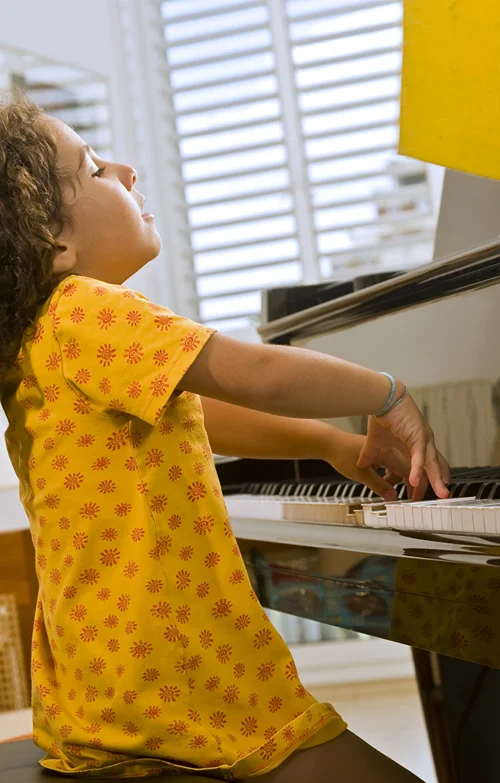How Early Should Your Child Learn to Play the Piano? Discover the Cognitive Benefits
It’s almost impossible nowadays to find kids playing hopscotch outdoors or having a traditional phone conversation with their schoolmates. Lately, it’s been all about video games or messenger chats. Screens entertain, but they rarely nurture the kind of focus, creativity, or emotional growth that something like learning a musical instrument can offer.
According to Harvard Health, too much gaming leads to circadian rhythm disorders – therefore, difficulty sleeping – anxiety, depression, insomnia, and the like. Not that you should ban your kids from playing video games, but there are more worthwhile activities to kick off their formative years, such as playing the piano.
A musical instrument invented in the 1700s, the piano offers several amazing health benefits, including what this activity can do for a child’s cognition. You’ve heard about history’s piano prodigies who started tinkering with the instrument during their childhood, from Wolfgang Amadeus Mozart himself to Frédéric Chopin.
Those insights lead to the question: How early should a child learn the piano? Discover when the right time to introduce your child to this musical instrument is, and find out how Music To Your Home private piano lessons help improve their cognitive well-being.
How Early Should a Child Learn How to Play the Piano?
When is it too early, and when is it too late? Experts from Music To Your Home, a private piano school in New York City, say that they must start between the ages of six and nine. Some kids will learn the instrument a little bit later, maybe because they saw their schoolmate bringing a piano in class and playing it, but if you wish your child can nourish this talent and be able to play a song on the piano without forcing it, they should begin before they turn 10.
Similar to introducing them to LEGO or to traveling abroad at an early age, early piano learning builds strong neural connections, enhances coordination, and fosters discipline. This time, let us focus on the first effect: building strong cognition.
7 Impressive Benefits of Learning Piano for Your Kids’ Brain Function
Realizing your child isn’t performing well in academics? You might want to consider enrolling them in a music school. Piano playing benefits the brain in so many ways:
1. Strengthens Memory and Retention
Memory and retention are two skills that kids need in school and real life. Aside from remembering historical facts, they need some good retention skills when they’re already exploring the real world by themselves, such as when traveling.
The way piano playing can strengthen memory and retention is when musical notes on paper are translated into hand movements. Children who learn music at a young age can perform better on memory-related tasks.
2. Improves Coordination and Fine Motor Skills
The brain is the body’s command center. When playing the piano, it’s like a mental gymnastics’ routine since your visual and hearing senses – for reading the notes and listening to the tunes – should be in sync with their hands and coordination with your cognitive abilities, too.
3. Boosts Focus and Attention Span
The average attention span of a person right now is just between eight to nine seconds, not bad if you’re sharing static visual content on Facebook, but too bad if you’re trying to sell a product or insurance, for instance.
Train your child to retain their attention span as they grow up by having them learn how to play the piano. This instrument is great for this training, as kids will concentrate on several things: notes, rhythm, posture, finger placement, and the like.
4. Supports Language and Math Development
It isn’t true that only mathematics prodigies can become piano superstar talent. However, what’s indisputable is that piano strengthens math development in counting beats, understanding fractions, and recognizing patterns on a music note sheet. Aside from developing math learning, playing the piano also supports language development.
5. Builds Emotional Awareness and Reduces Stress
Does your child get too emotional quickly when finding themselves in an unfavorable situation in school? Do they get easily stressed out? Now is the proper time to combat these by introducing them to piano lessons.
This instrument gives them an outlet to express themselves. Plain and simple. Scientifically, playing the piano lowers stress hormones and boosts mood chemicals in the brain.
6. Encourages Lifelong Learning and Confidence
When kids see they’ve fulfilled their goals, whether playing their favorite song on the piano or performing in a recital, they feel more ready to take on new challenges in the future. This is another amazing benefit that piano playing can give.
7. A Smart Investment in Their Future
In this day and age, it isn’t enough for kids to just be sports-minded or academically inclined; they must also be well-rounded, a jack of all trades of some sort.
Signing up your child for piano lessons is an investment in their future, as well as for the development of a sharper mindset. Don’t be surprised if they’ve de-cluttered their room before you even tell them to after a piano playing session.
So, whether your child is just starting school or already juggling homework and after-school activities, the piano is one of those rare outlets that supports the whole child – mind, body, and heart. Enroll your child in a piano school today!




